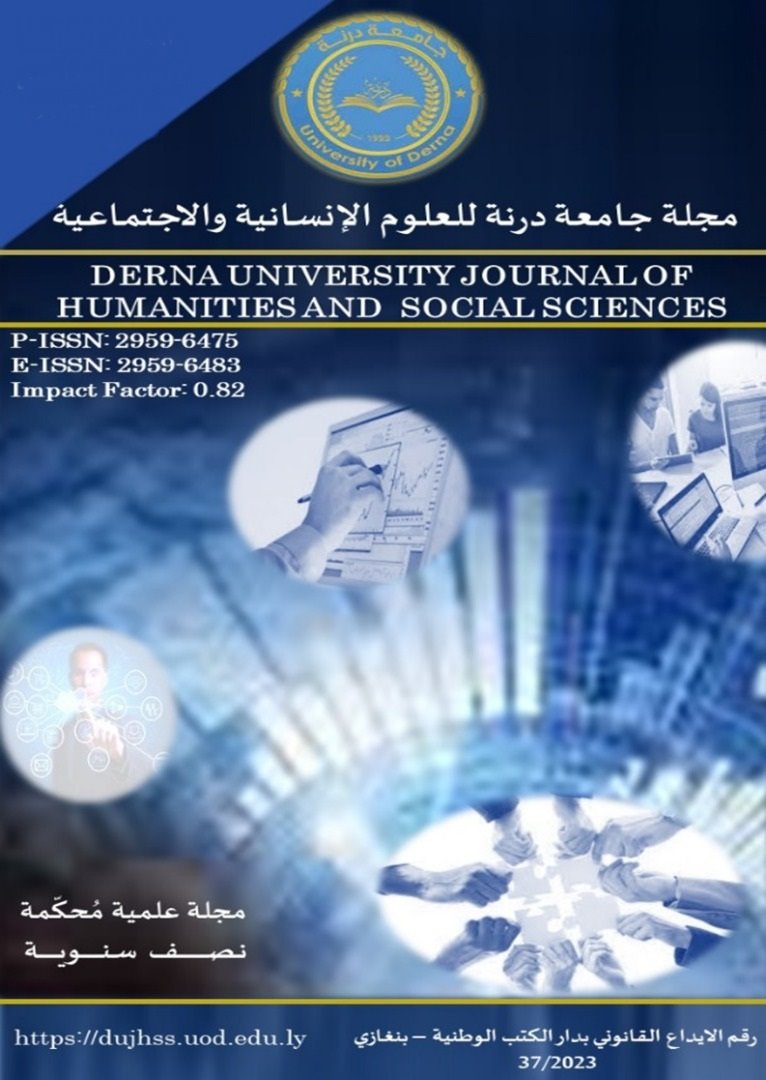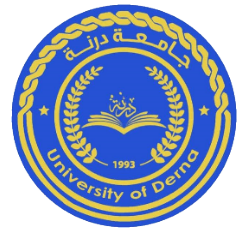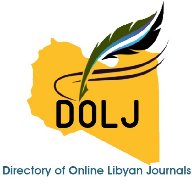English Language Learning among Media Department Students at the University of Derna via Facebook as a Social Media Tool
الكلمات المفتاحية:
Technology، social media، Facebook، English language learning، genderالملخص
Social networking has become integral to daily life, with Facebook standing out as a vital tool for communication. This study examines the use of Facebook for learning English as a foreign language (EFL) among undergraduates in the Media Department at the University of Derna, focusing on gender disparities. A questionnaire survey of 120 students indicated that they use Facebook on a regular basis, and the participants exhibited good attitudes, high motivation, and confidence in their ability to use the platform to enhance their English skills. They reported significant benefits, including acquiring new vocabulary and syntactic structures. The study concluded that both male and female students held positive attitudes toward learning English after using Facebook. The study concludes by encouraging further research into students’ perspectives on Facebook as a language-learning tool and addressing potential challenges in its integration.
المراجع
Abidin, M. J. Z., Ahmad, N., & Kabilan, M. K. (2010). Facebook: An online environment for learning of English in institutions of higher education. Internet and Higher Education, 13(4), 179–187.
Ajjan, H., & Hartshorne, R., (2008). Investigating faculty decisions to adopt Web 2.0 technologies: theory and empirical tests. The Internet and Higher Education, Vol. 11, No. 2, pp. 71-80.
Alm, Antonie. (2006). CALL for autonomy, competence and relatedness: Motivating language learning environments in Web 2.0. The JALT CALL Journal, 2(3), 29-38.
Aydin, S. (2014). Foreign language learners’ interactions with their teachers on Facebook. System, 42, 155–163.
Barker, V. (2009). Older adolescents’ motivations for social network site use: The influence of gender, group identity, and collective self-esteem. Cyberpsychology & Behavior : The Impact of the Internet, Multimedia and Virtual Reality on Behavior and Society, 12(2), 209-213.
Blake, R (1998). The role of technology in second language learning. In H. Byrnes (Ed.), Learning foreign and second languages: Perspectives in research and scholarship (pp. 209-237). New York: Modern Language Association.
Blattner, Géraldine, & Fiori, Melissa. (2009). Facebook in the language classroom: Promises and possibilities. International Journal of Instructional Technology and Distance Learning, 6(1), 17-28.
Creswell, J. W., Hanson, W. E., Clark Plano, V. L., & Morales, a. (2007). Qualitative Research Designs:Selection and Implementation. The Counseling Psychologist, 35(2), 236–264.
Depew, K. E. (2011). Social media at academia’s periphery: Studying multilingual developmental writers’ Facebook composing strategies. Reading Matrix: An International Online Journal, 11(1), 54–75.
Godwin-Jones, R. (2008). Mobile computing technologies: Lighter, faster, smarter. Language Learning & Technology, 12(3), 3−9.
Gumport, Patricia J., & Chun, Marc. (1999). Technology and higher education: Opportunities and challenges for the new era: National Center for Postsecondary Improvement, Stanford University, School of Educaiton.
Hamilton, B. (2009). Young adult literature. Library media Connection, 28(3), 14–15.
Harrison, R., & Thomas, M. (2009). Identity in online communities: Social networking sites and language learning. International Journal of Emerging Technologies and Society, Vol. 7, No. 2, pp. 109-124.
Kabilan, M.K., Ahmad, N., & Abidin, M.J.Z. (2010). Facebook: An online environment for learning of English in institutions of higher education? Internet and Higher Education, 13(4), 179-187.
Kaplan, Andreas M, & Haenlein, Michael. (2010). Users of the world, unite! The challenges and opportunities of Social Media. Business horizons, 53(1), 59-68.
McLoughlin, C. & Lee, M. J. W.,(2008). Mapping the digital terrain: New media and social software as catalysts for pedagogical change. Hello! Where are you in the landscape of educational technology? Proceedings ascilite Melbourne.
Mills, N. A., (2009). Facebook and the use of social networking tools to enhance language learner motivation and engagement. Northeast Association for Language Learning Technology (NEALLT) Conference, Yale University, New Haven.
Shahrokni, S. (2009). Second language incidental vocabulary learning: The effect of online textual, pictorial, and textual pictorial glosses. TESL-EJ, 13(3), 1−17.
Shin, R. C., (2011). Can Web 2.0 technology assist college students in learning English writing? Integrating Facebook and peer assessment with blended learning. Australasian Journal of Education Technology, Vol. 27, No. 5, pp. 829-845.
Sturgeon, C. M., & Walker, C. (2009). Faculty on Facebook: Confirm or deny?. Paper Presented at the Annual Instructional Technology Conference. Murfreesboro, TN.
Villano, M. (2007). Social revolution. Campus Technology, 20(5), 40–45.
Walker, A. (2010). Using social networks and ICTs to enhance literature circles: A practical approach. Paper Presented at the School Library Association of Queensland and the International Association of School Librarianship Conference. Brisbane, Australia.
Wamba, S. F., & Carter, L. (2016). Social media tools adoption and use by SMES: An empirical study. In social media and Networking: Concepts, Methodologies, Tools, and Applications (pp. 791-806). IGI Globa



























